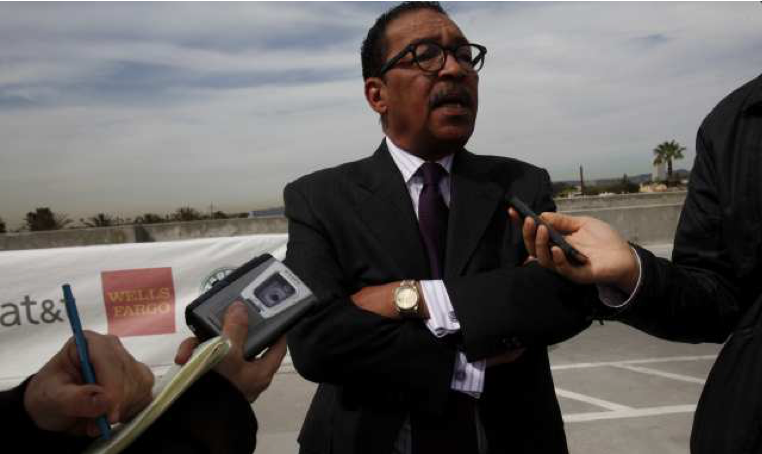Comments@THE GUSS REPORT-We had some fun with the toadies at the Los Angeles Times last week to see whether an embarrassed politician can be prompted to run to the newspaper’s servile reporters for some TLC (Tender Loving Cover) and damage control PR.
As demonstrated by The Times’ Editorial Board’s recent endorsement of Antonio Villaraigosa for California governor, the paper has a long history of protecting and promoting politicians despite legacies of ineptitude.
But biases should not be evident from news reporters.
Last week, The Times published a story about LA City Council president Herb Wesson’s misuse of LAPD security for his son’s wedding, an opulent family affair. But Times reporters – namely Richard Winton and David Zahniser – failed to inform their readers that Wesson wasn’t just the subject of the story, but his City Hall staff was its source as well.
Planting a story may not be uncommon, but in this case, it raises the question of why a politician’s staff would ask the LA Times to write what amounts to an embarrassing story of the official’s misuse of taxpayer assets for a private family celebration.
The answer is damage control.
I explain below, but first, here’s how it went down.
A few weeks back, this column continued its exposés on Wesson’s personal financial problems, including his defaulting on his credit card despite a gross annual household income approaching $500,000. The Times, ever a Wesson cheerleader, dragged its feet for nearly a week before posting a story about it online on a Friday afternoon, a bury-the-news ruse.
Fast-forward to a few days ago when – for the first time in 1,067 days – I got an email from Wesson’s communications director Vanessa Rodriguez, offering to field my questions for an upcoming column, though as predicted, she didn’t answer any of my questions. While her stated goal was to provide information, her actual goal was solely to obtain it.
So I pondered, how would Wesson’s office respond if made aware of a marginally embarrassing story about his misuse of LAPD resources for his son’s wedding? Would they run to The Times to do preemptive damage control with a newspaper that functions more as a crisis management firm?
So it was put to the test…
Last Tuesday, August 7, toward the close of business at 5:03 p.m., I sent Wesson, Rodriguez, Wesson’s staffer son Justin, and Deron Williams and Andrew Westall, Wesson’s chief of staff and assistant chief deputy, respectively, the following email:
All,
I just received a breakdown of the cost for the taxpayer funded security at the Wesson's private wedding ceremony and reception functions. If Herb wishes to field direct questions about it, my deadline is 10 am.
Also, the deleted wedding photos have surfaced on a Google bot, and I have questions for Herb about them, as well.
Dan
Note the stated deadline of 10 a.m. the next day. It was a non-existent deadline employed to prompt Team Wesson into action.
Sure enough…
At 11 a.m. the next day, the LA Times, in the form of Zahniser or Winton, contacted the LAPD for – wait for it – information on taxpayer-funded LAPD security for Wesson’s family event.
While Zahniser and Winton may have been unwitting dupes for Team Wesson, using material that I had requested (but did not use) from the LAPD a week earlier, what they produced was a piece that downplayed the story and misled the public by omitting that Wesson’s people asked them to write it.
(Note: LAPD corrected the number of hours provided to Wesson to 48. The Times article incorrectly says 38.)
Did Winton or Zahniser (who did not respond when asked whether Wesson’s office fed them the story) ask themselves why a politician might bring an embarrassing story to their attention in the first place? Or did the lapdogs do as their master wanted, and publish a story to tamp down a controversy?
Winton and Zahniser also misled their readers by stating that mere dozens of people attended the wedding, but a now-deleted photo of the seating chart captured from an LA lifestyle blog shows approximately 217 guests.
Did the Times intentionally downsize the Wesson wedding to mislead their readers (or his creditors) into thinking he wasn’t spending lavishly while simultaneously defaulting on multiple banks, ranging from credit cards to mortgage holders?
That’s important because at-play is The Times’ slavish devotion to getting Wesson elected LA County Supervisor when Mark Ridley-Thomas is termed out (as Wesson will be) in a few short years -- and to artificially engineer Wesson’s son into the seat currently occupied by his father.
Ron Galperin, the LA City Controller, and Paul Krekorian, City Council’s Budget and Finance Chair, did not respond when repeatedly asked whether private use of public resources is wasteful and unfair to taxpayers.
Keep in mind that the issue here is not whether Wesson should get LAPD security for his private family gathering, but whether taxpayers should pay for it.
Another unanswered question is whether those free LAPD services are considered taxable income by the IRS. A case can be made for that.
Wesson, as a City Councilmember, is a city employee, as are two of his sons and now daughter-in-law, Alexis Marin. Security for a private family party is not “an ordinary and necessary expense” for employment; it’s a personal expense. When an employer pays employees’ personal expenses, it is taxable income.
Cue the music…
(Daniel Guss, MBA, is a member of the Los Angeles Press Club, and has contributed to CityWatch, KFI AM-640, Huffington Post, Los Angeles Times, Los Angeles Daily News, Los Angeles Magazine, Movieline Magazine, Emmy Magazine, Los Angeles Business Journal and elsewhere. Follow him on Twitter @TheGussReport. Join his mailing list or offer verifiable tips and story ideas at [email protected]. His opinions are his own and do not necessarily reflect the views of CityWatch.) Edited for CityWatch by Linda Abrams.
Tags:
















